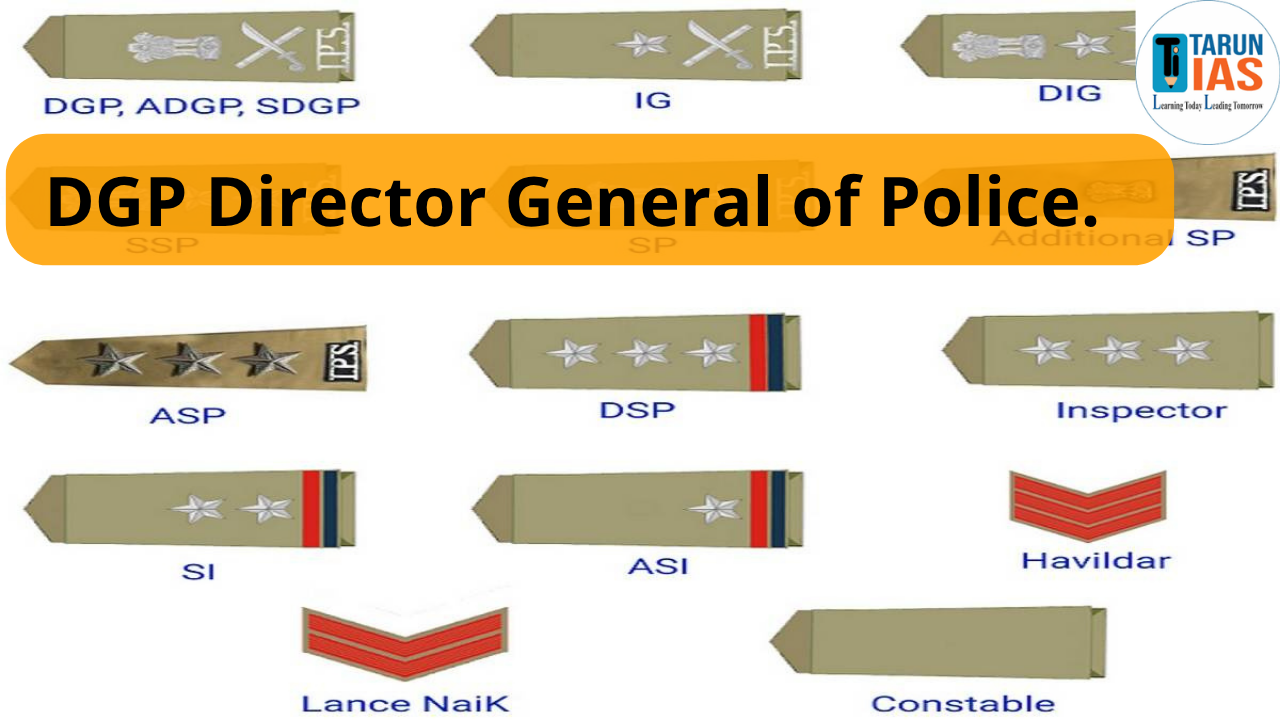When we talk about the police force in India, we often hear terms like SP, DSP, IG, and DGP. Among these, DGP is the highest police rank in a state or union territory.
DGP Full Form
The full form of DGP is Director General of Police. A DGP is an officer from the Indian Police Service (IPS) and holds a three-star rank.The DGP is the head of the state police force, just like how the Chief Secretary is the top most officer in the administrative side.
DGP Who is?
A DGP is the senior-most police officer of a state or Union Territory. He or she leads the entire police department in the region and is responsible for maintaining law and order, public safety, and crime control. The DGP reports directly to the state government (mainly the Chief Minister and Home Minister).
Some other departments where a DGP-rank officer may work include:
- Director of Vigilance
- Director General of Prisons
- Director General of Fire Services & Civil Defence
- Director General of Criminal Investigation Department (CID)
Also, many central agencies like the CBI, CRPF, or SVPNPA (Sardar Vallabhbhai Patel National Police Academy) are headed by officers of DGP rank.
DGP Selection Process
The process of selecting and appointing a Director General of Police (DGP) differs based on the legal and administrative structure of each state or country. In some regions, the DGP is directly appointed by the government or top executive officials. In others, the selection is carried out through a competitive process overseen by a designated committee or board. Key factors considered during the selection include the officer’s seniority, experience, service record, and leadership abilities.
DGP Roles and Responsibilities
The Director General of Police has a very big responsibility. Let’s understand what work they do:
1. Head of State Police
- Leads the entire police force in the state or UT.
- Controls all zones, districts, commissionerates.
2. Advisor to Government
- Advises the Chief Minister and Home Minister on all police-related matters.
- Gives suggestions for policy and law-and-order management.
3. Maintaining Law and Order
- Ensures peace, controls crimes, handles protests and riots.
- Guides action in cases of emergencies like political unrest, strikes, or communal violence.
- Training and Discipline
- Ensures proper training of lower-rank police officers.
- Maintains discipline, morale, and professionalism in the police force.
5. Operational Commands
- Directs police operations during big cases or threats.
- Can call for special units, intelligence, or reserve police when needed.
6. Administrative Duties
- Issues rules and orders under the Police Act.
- Approves major decisions after consultation with the government.
7. Monitoring Police Performance
- Reviews reports from SPs, DIGs, and other officers.
- Visits districts to monitor ground reality.
DGP Significance
The DGP plays a crucial role in upholding law and order and ensuring public safety. Their policies, decisions, and leadership directly influence how the police force operates and how citizens experience security and justice. As the top police official, the DGP serves as a vital link between the police department, government authorities, and the public, promoting coordination, transparency, and effective communication across all levels.
DGP Appointment Challenges
Despite rules, the appointment of DGP is still a hot topic in many states. Some issues are:
- Political Pressure: Governments often want loyal officers.
- Bureaucratic Delays: Many times, there is a delay in forming the UPSC panel.
- Legal Battles: Disputes over appointments often reach courts.
- Frequent Transfers: Some DGPs serve for only a few months.
This affects police independence and public trust.
Conclusion
The DGP (Director General of Police) is the topmost police officer in any state or UT. He/she leads the entire police department and is responsible for public safety, crime control, and police discipline. While the post carries great authority, it also comes with big responsibility and public expectations. The DGP must act as a protector of law, a guide to the police force, and a servant to the people.not a tool of political power.
DGP Full Form FAQs
What is the full form of DGP in the police force?
The full form of DGP is Director General of Police. A DGP is a three-star IPS officer and holds the highest rank in the police department of a state or Union Territory. The DGP heads the entire state police force and reports directly to the state government.
Who appoints the DGP in a state, and what is the selection process?
The state government appoints the DGP, typically from a panel of senior IPS officers recommended by the Union Public Service Commission (UPSC). The selection is based on seniority, service record, leadership skills, and overall experience. However, political interference and legal delays sometimes affect the appointment process.
What are the main responsibilities of a DGP in India?
A DGP is responsible for:
- Maintaining law and order
- Advising the state government on policing matters
- Overseeing police operations and strategy
- Ensuring discipline and training of officers
Monitoring police performance across districts
They serve as the topmost leader of the police force in a state or UT.
Can a DGP serve in central agencies like CBI or CRPF?
Yes, IPS officers of DGP rank can head central agencies like the Central Bureau of Investigation (CBI), Central Reserve Police Force (CRPF), or National Police Academy (SVPNPA). They may also serve as Directors General in Vigilance, CID, Fire Services, and Prisons departments.
What challenges are faced in the appointment and functioning of a DGP?
DGP appointments often face challenges such as:
- Political pressure to appoint loyal officers
- Delays in forming UPSC panels
- Frequent transfers, reducing effectiveness
- Legal disputes over eligibility or selection
These issues can undermine police independence and public confidence.















